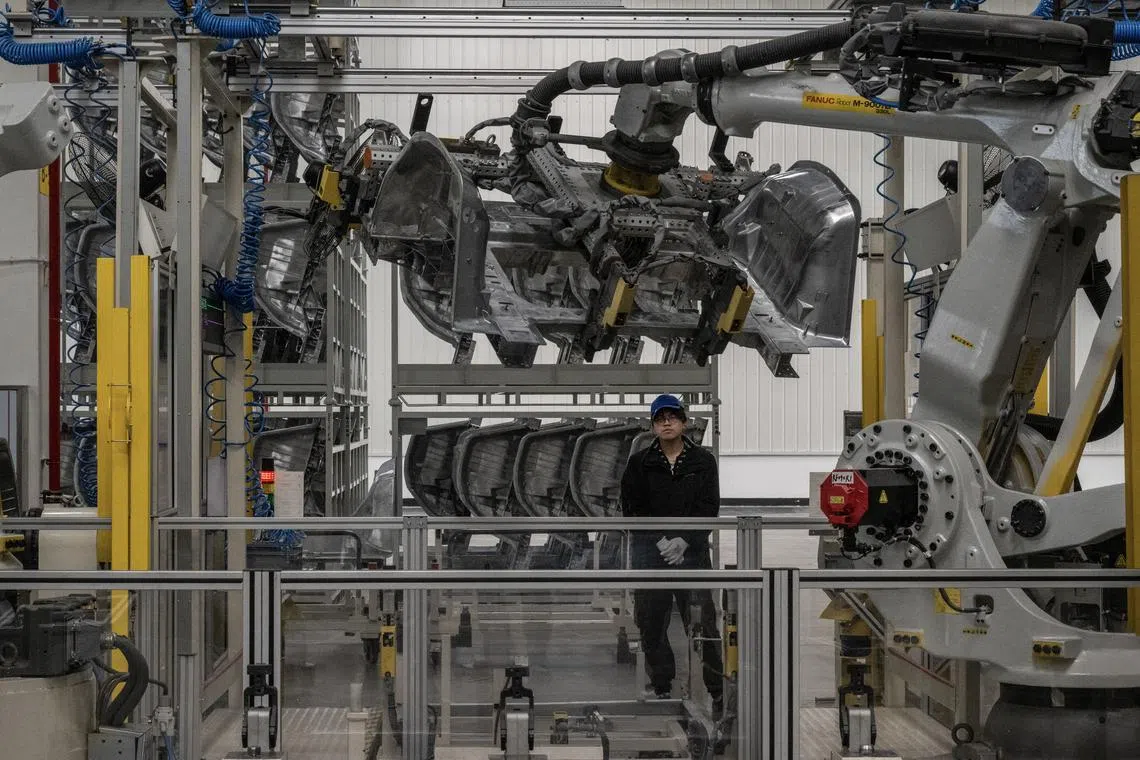Biden hikes tariffs on Chinese EVs, computer chips, medical products
Sign up now: Get ST's newsletters delivered to your inbox

The EV figure, while headline-grabbing, may have more political than practical impact in the US, which imports very few Chinese EVs.
PHOTO: NYTIMES
WASHINGTON – US President Joe Biden on May 14 unveiled steep tariff increases on an array of Chinese imports including electric vehicles (EVs), computer chips and medical products, risking an election-year standoff with Beijing as he woos American voters who give his economic policies low marks.
“American workers can out-work and out-compete anyone as long as the competition is fair, but for too long it hasn’t been fair,” he said during a speech in the White House Rose Garden before representatives from unions and companies.
“We’re not going to let China flood our market.”
China immediately vowed retaliation. Its commerce ministry said Beijing is opposed to the tariff hikes
Mr Liu Pengyu, a spokesman for the Chinese Embassy in Washington, DC, described the tariffs as a disappointing “political manoeuvre” that he said is in violation of World Trade Organisation (WTO) rules.
He also argued that China’s production of green energy products is not out of line with growing global demand.
“We hope the US can take a positive view of China’s development and stop using overcapacity as an excuse for trade protectionism,” Mr Liu added.
He said Beijing had not determined how it would respond, but noted that the US exported large quantities of soybeans to China, and that Tesla, the American EV manufacturer, sold hundreds of thousands of cars that it made in China in 2023.
Mr Biden will keep tariffs put in place by his Republican predecessor Donald Trump while ratcheting up others, including a quadrupling of EV duties to over 100 per cent and doubling the duties on semiconductors to 50 per cent.
The new measures affect US$18 billion (S$24 billion) in imported Chinese goods including steel and aluminium, semiconductors, EVs, critical minerals, solar cells and cranes, the White House said.
The EV figure, while headline-grabbing, may have more political than practical impact in the US, which imports very few Chinese EVs.
The US imported US$427 billion in goods from China in 2023 and exported US$148 billion to the world’s No. 2 economy, according to the US Census Bureau, a trade gap that has persisted for decades and become an ever more sensitive subject in Washington.
US Trade Representative Katherine Tai said the revised tariffs are justified because China is stealing US intellectual property. But she recommended tariff exclusions for hundreds of industrial machinery import categories from China, including 19 for solar product manufacturing equipment.
Even as Mr Biden’s steps fell in line with Trump’s premise that tougher trade measures are warranted, the Democrat took aim at his opponent in November’s election.
Mr Biden cast Trump’s 2020 trade deal with China as failing to increase American exports or jobs, and he said a Trump proposal to raise import tariffs 10 per cent across the board from any point of origin would raise prices.
Trump, who has floated tariffs of 60 per cent or higher on all Chinese goods, said on May 14 the Biden administration’s new tariffs should be applied to other types of vehicles and products “because China’s eating our lunch right now”.
“He’s been feeding them a long time,” Mr Biden retorted when asked about the comment.
Administration officials said their measures are combined with domestic investment in key industries and unlikely to worsen a bout of inflation that has already angered US voters.
Mr Biden has struggled to convince voters of the efficacy of his economic policies despite a backdrop of low unemployment and above-trend economic growth. A Reuters/Ipsos poll in April showed Trump had a seven percentage-point edge over Mr Biden on the economy.
Analysts have warned that a trade tiff could raise costs for EVs overall, hurting Mr Biden’s climate goals and aim to create manufacturing jobs.
He has said he wants to win this era of competition with China but not to launch a trade war. He has worked in recent months to ease tensions in one-on-one talks with Chinese President Xi Jinping.
Both 2024 US presidential candidates have departed from a free-trade consensus that once reigned in Washington, a period capped by China’s joining the WTO in 2001. Trump’s broader imposition of tariffs during his 2017-2021 presidency kicked off a tariff war with Beijing.
More tariffs will follow in 2025 and 2026 on semiconductors as well as lithium-ion batteries that are not used in EVs, graphite and permanent magnets as well as rubber medical and surgical gloves.
A step Mr Biden previously announced to raise tariffs on some steel and aluminium products will take effect this year, the White House said.
A number of lawmakers have called for massive hikes on Chinese vehicle tariffs or an outright ban over data privacy concerns. There are relatively few Chinese-made light-duty vehicles being imported now.
The United Auto Workers, a politically important union that endorsed Mr Biden, said the tariff moves would ensure that “the transition to electric vehicles is a just transition”. REUTERS, NYTIMES


